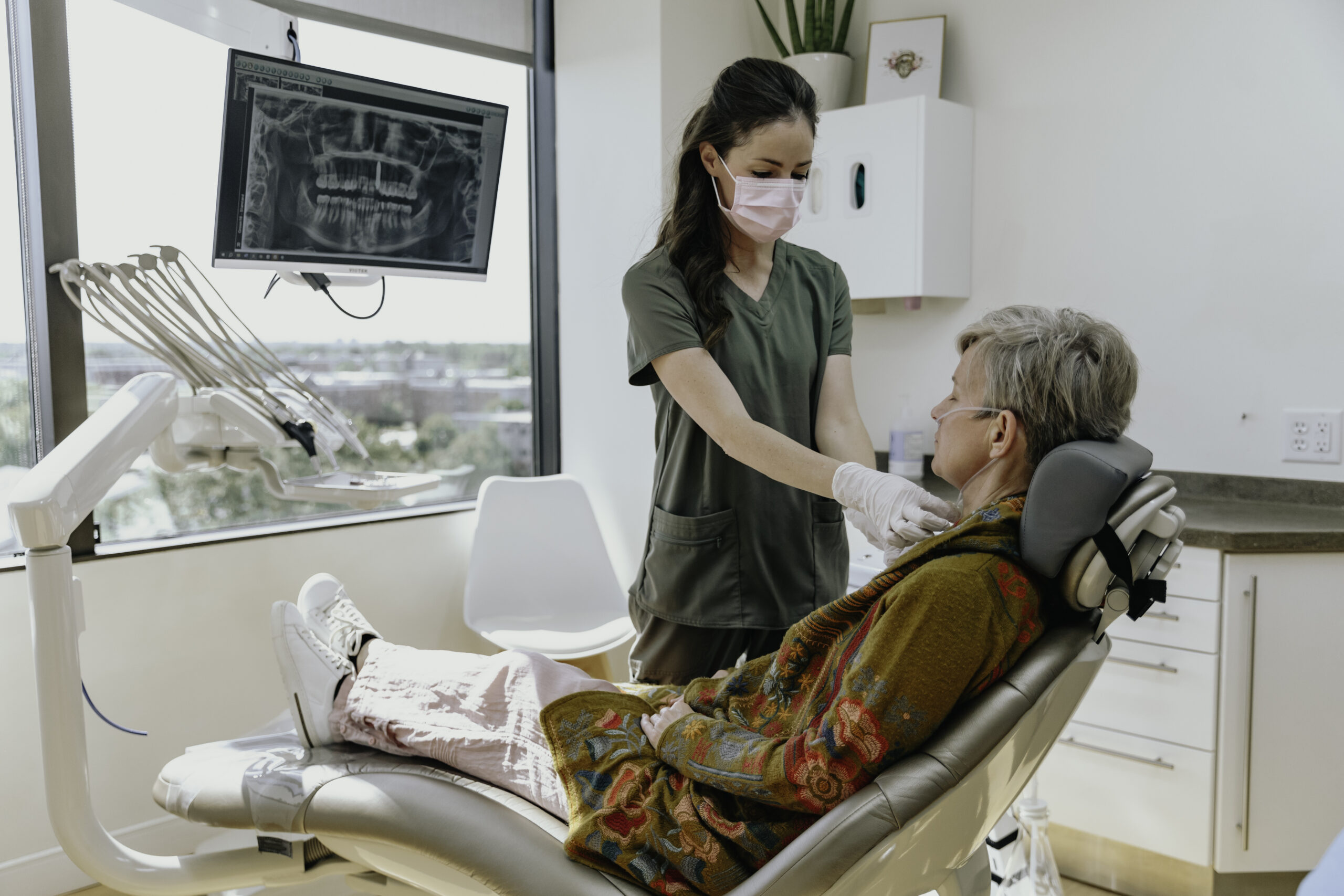What “Stopping” Gum Recession Really Means
“Stopping” gum recession means halting progression, calming sensitive areas, and protecting exposed roots. Gums don’t grow back on their own, but with the right plan you can control inflammation, reduce sensitivity, and restore where appropriate.
Quick Self-Check: Are Your Gums Receding?
- Teeth look “longer” than they used to
- Sensitivity to cold, sweets, or brushing
- Red, swollen, or bleeding gums
- Bad breath or a bad taste that won’t go away
If you’re nodding yes, keep reading—your next step depends on the cause.
Find your Cause → Match the Fix
Recession is a symptom. Treating the underlying driver is how you stop it from getting worse.
Common drivers
- Overbrushing or hard brushing technique
- Plaque buildup and periodontal inflammation
- Clenching/grinding (bruxism), high bite spots
- Mouth breathing or chronic dry mouth
- Tobacco use or oral piercings
- Naturally thin gum/ bone biotype
- Crowding or misalignment
What to Expect at Dr. Dickersons Office

Less common
- Orthodontic movement outside the bony envelope
- Tight frenum pulls
- Hormonal or systemic influences
Cause → At-Home Step → In-Office Step
Cause
Overbrushing/Hard brush
Plaque/Periodontal inflammation
Clenching/Grinding
Mouth breathing/Dry mouth
Tobacco/Piercings
Thin biotype
Misalignment
At-Home Step
Use extra-soft brush, gentle pressure, short strokes
Daily brushing + interdental cleaning
Nightly guard compliance, jaw relaxation habits
Humidify room, hydrate, xylitol lozenges
Stop tobacco; remove irritating jewelry
Gentle care; avoid trauma
Interdental cleaning focus
In-Office Step (Our Protocol)
Hygiene coaching; desensitizers; selective recontouring if needed
Laser-assisted deep clean with ozone decontamination—then we recheck gum depths.
Occlusal guard; adjust high bite spots; trigger management
Saliva-supportive strategies; coordinate with ENT as needed
Site-specific debridement with diode laser + ozone adjuncts
Tissue-preserving hygiene; evaluate for augmentation
Ortho consult; cleanings with laser + ozone adjuncts
What You Can Do at Home
- Use an extra-soft brush + light pressure. Let the bristles, not your arm, do the work.
- Clean between teeth daily. Floss, soft picks, or water irrigators—choose what you’ll actually use.
- Soothe sensitivity. Desensitizing toothpaste on exposed root areas can help.
- Protect your gums at night. If you clench or grind, wear your guard consistently.
- Support saliva. Sip water, consider xylitol mints/lozenges, and limit mouth breathing.
What Your Dentist Can Do
Thorough diagnosis. We measure gum pockets, check attachment levels and bone on X-rays, and assess your bite, airway, and habits. This maps the “why” behind your recession.Periodontal therapy—our standard protocol.
For most periodontal cases in our practice, we combine precise mechanical cleaning with two adjuncts:
- Diode laser therapy for bacterial reduction at the sulcus and gentle photobiomodulation (biostimulation) to support soft-tissue healing.
- Ozone therapy (ozonated water/oil) to irrigate and decontaminate periodontal pockets and help disrupt biofilm.
This pairing is designed to calm inflammation, reduce bacterial load, and support healing with a minimally invasive approach. After therapy, we re-measure pocket depths and tailor ongoing maintenance.
Bite balancing & habit support. We smooth high bite spots, fit occlusal guards when appropriate, and coach jaw-relaxation habits to reduce mechanical stress on gums.
When grafting is appropriate. If you have deep recession, root exposure with ongoing sensitivity, or esthetic concerns, we’ll discuss tissue grafting options and expected recovery in plain language.
Our Standard Periodontal Care Protocol
In most periodontal cases, we use diode laser therapy + ozone treatment alongside meticulous cleaning. It’s part of our minimally invasive, holistic philosophy to help stabilize gum health.
Why Choose Dr.Sharon Dickerson
What sets Sharon Dickerson DDS apart is the whole-patient approach:
- Comprehensive Intake: Every procedure begins with an in-depth review of your health to ensure safe, effective treatment.
- Trauma-Informed Care: Each step is designed to reduce stress and honor patient comfort, especially for those with dental anxiety.
- Whole-Body Health: Recognizing how oral health impacts systemic wellness.
- Eco-Friendly Practices: Mercury-free, fluoride-free crowns with biocompatible materials.
- Premium Experience: A welcoming, beautifully designed office environment that helps patients feel at ease.
- Proven Authority: Dr. Dickerson brings 30+ years of experience and advanced certifications to every procedure.
When to Book
- Gums bleed when brushing or flossing
- Teeth feel loose, sore, or “longer”
- Ongoing bad breath, pus, or a bad taste
- Sensitivity that’s getting worse
- Recession deeper than ~2–3 mm or changing quickly
FAQ’s
Not on their own. The goal is to halt progression, protect exposed roots, and, when needed, restore tissues with procedures like grafting.
Diode lasers are commonly used as an adjunct during periodontal care to reduce bacterial load around the gums and to support soft-tissue healing. We apply them conservatively as part of a comprehensive plan.
We use ozonated water or oil to irrigate periodontal pockets and help decontaminate the area. Patients typically find it comfortable; it’s a gentle adjunct to cleaning.
Yes. Mechanical cleaning is foundational. We use laser and ozone in addition to thorough debridement to support calmer gums and better maintenance.
Many patients notice improvement in a few weeks with consistent home care and scheduled maintenance. Timelines vary based on your baseline inflammation and habits.
Sometimes. We recommend grafting for deeper defects, sensitivity that doesn’t resolve, or esthetic concerns. We’ll review options and expected healing if it’s appropriate for you.
You Deserve Gentle, Personalized Care
At Sharon Dickerson DDS, the process is designed to be gentle, precise, and holistic with over three decades of expertise.
Take the next step toward restoring your smile with comfort and confidence.

